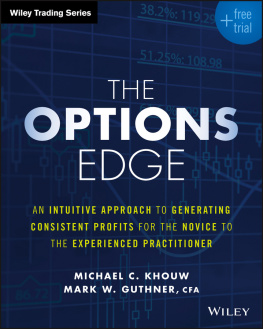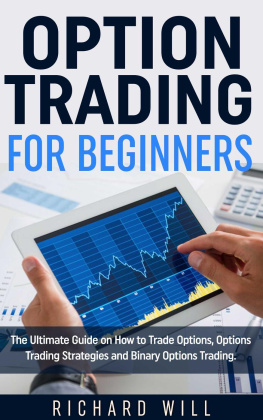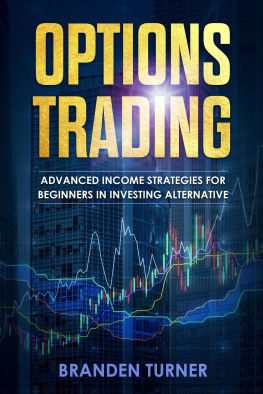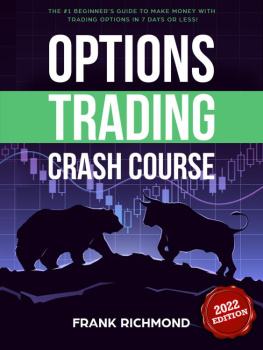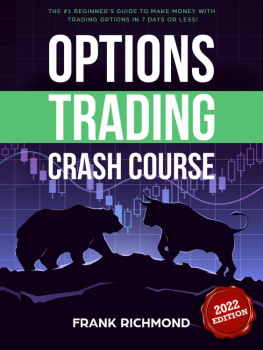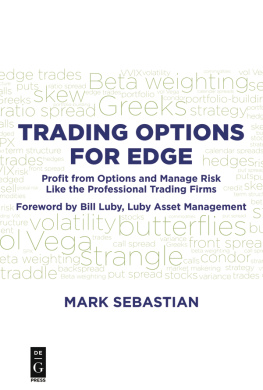
The Wiley Trading series features books by traders who have survived the market's ever changing temperament and have prosperedsome by reinventing systems, others by getting back to basics. Whether a novice trader, professional, or somewhere in-between, these books will provide the advice and strategies needed to prosper today and well into the future. For more on this series, visit our website at www.WileyTrading.com.
Founded in 1807, John Wiley & Sons is the oldest independent publishing company in the United States. With offices in North America, Europe, Australia, and Asia, Wiley is globally committed to developing and marketing print and electronic products and services for our customers' professional and personal knowledge and understanding.
Copyright 2016 by Mark W. Guthner, CFA, and Michael C. Khouw. All rights reserved.
Published by John Wiley & Sons, Inc., Hoboken, New Jersey.
Published simultaneously in Canada.
No part of this publication may be reproduced, stored in a retrieval system, or transmitted in any form or by any means, electronic, mechanical, photocopying, recording, scanning, or otherwise, except as permitted under Section 107 or 108 of the 1976 United States Copyright Act, without either the prior written permission of the Publisher, or authorization through payment of the appropriate per-copy fee to the Copyright Clearance Center, Inc., 222 Rosewood Drive, Danvers, MA 01923, (978) 750-8400, fax (978) 646-8600, or on theWeb at www.copyright.com. Requests to the Publisher for permission should be addressed to the Permissions Department, John Wiley & Sons, Inc., 111 River Street, Hoboken, NJ 07030, (201) 748-6011, fax (201) 748-6008, or online at http://www.wiley.com/go/permissions.
Limit of Liability/Disclaimer of Warranty: While the publisher and author have used their best efforts in preparing this book, they make no representations or warranties with respect to the accuracy or completeness of the contents of this book and specifically disclaim any implied warranties of merchantability or fitness for a particular purpose. No warranty may be created or extended by sales representatives or written sales materials. The advice and strategies contained herein may not be suitable for your situation. You should consult with a professional where appropriate. Neither the publisher nor author shall be liable for any loss of profit or any other commercial damages, including but not limited to special, incidental, consequential, or other damages.
For general information on our other products and services or for technical support, please contact our Customer Care Department within the United States at (800) 762-2974, outside the United States at (317) 572-3993 or fax (317) 572-4002.
Wiley publishes in a variety of print and electronic formats and by print-on-demand. Some material included with standard print versions of this book may not be included in e-books or in print-on-demand. If this book refers to media such as a CD or DVD that is not included in the version you purchased, you may download this material at http://booksupport.wiley.com. For more information about Wiley products, visit www.wiley.com.
Library of Congress Cataloging-in-Publication Data:
Names: Guthner, Mark, author. | Khouw, Michael, 1968 author.
Title: Options play : an intuitive approach to generating consistent profits for the novice to the experienced practitioner / Mark W. Guthner, Michael Khouw.
Description: Hoboken, New Jersey : JohnWiley & Sons, Inc., [2016] | Series:Wiley trading | Includes bibliographical references and index.
Identifiers: LCCN 2015043835 (print) | LCCN 2015049131 (ebook) | ISBN 9781119212416 (paperback) | ISBN 9781119212447 (pdf) | ISBN 9781119212423 (epub)
Subjects: LCSH: Options (Finance)
Classification: LCC HG6024.A3 G88 2016 (print) | LCC HG6024.A3 (ebook) | DDC 332.63/2283dc23
LC record available at http://lccn.loc.gov/2015043835
Cover image:Wiley
Cover design: Timashov Sergiy/Shutterstock
Introduction
Options on stocks, indices, and futures often get a bad rap. Journalists, pundits, and casual market observers criticize these derivative financial instruments as too complicated, subject to abuse, and difficult to understand, value, and trade profitably. They go on to claim that they are a structural cause of financial calamities and something should be done to limit their use. Many seasoned investment professionals are unnecessarily intimidated by derivative instruments in general, and options in particular. After all, there are a host of options available to trade on individual stocks, market indeces, bonds, commodities, and other financial assets. With so many choices in standardized exchange-listed options, and an infinite number of bespoke products available over the counter, selecting the best option to satisfy one's investment objectives can be daunting. Complicating the task is their flexibility. Options are customizable and often constructed into unusual-sounding structures. Finally, the mathematics sophisticated practitioners' use to price and hedge options are intimidating to some as well.
If those concerns have prevented you from trading options, you might be surprised to learn that even if you are new to the investment world, even if you have never bought or sold a stock, you have probably bought options without realizing it. If you have purchased airline tickets, property insurance, or life insurance, you have unwittingly bought an option. If you have applied to a number of colleges and received an acceptance letter, you have bought a free option. Options are a part of everyday life, and they are everywhere. Since options are a part of your everyday life, you can improve your standard of living by an awareness of options available all around you when arranging your financial affairs.
Consider the conventional college acceptance. Once a college applicant is accepted, the person has the option, but not the obligation, to attend. He or she can choose to attend that college, attend another college, or not attend any college at all. The important point is that the college acceptance letter represents a right but not an obligation to attend an institution of higher learning. This is a fundamental characteristic of an option. The terms of the college acceptance letter give the would-be student optionality. There are exceptions to every rule of course. If the acceptance letter is presented in response to a request for early decision or early action and the college agrees, the applicant is obliged to attend that university. The acceptance letter is no longer an option, but a binding obligation.
How about an airline ticket? When one holds an airline ticket, one has the right, but not the obligation, to travel on a specific flight. When the traveler presents the ticket at the gate, the airline has the obligation to provide a seat. On the other hand, if a ticketholder chooses not to get on the plane or is unable to, the airline cannot compel the person to get onboard or ask for additional money. Most ticket purchasers exercise their option. They do so by actually taking the flight. In short, the ticketholder owns an option to fly or not fly.
Airlines know that some passengers will not exercise their right to take the contracted flight. To maximize profits, they want to be sure there is a passenger in every seat. To fill as many seats a possible, the airline will sell more options (i.e., airline tickets) than there are seats (i.e., naked options) on the designated flight. This places the airline at risk. If more passengers exercise their right to fly than available seats, they must provide additional compensation to the affected traveler. Some airline seat agrements offer full or partial refunds to travelers who do not fly. This option to get one's money back has value and airlines charge a premium for it. Travelers who are uncertain about their travel schedule are willing to pay this cancelation premium by paying a higher ticket price.
Next page
